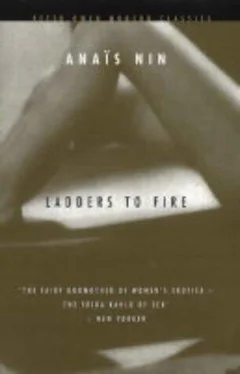Anaïs Nin - Ladders to Fire
Здесь есть возможность читать онлайн «Anaïs Nin - Ladders to Fire» весь текст электронной книги совершенно бесплатно (целиком полную версию без сокращений). В некоторых случаях можно слушать аудио, скачать через торрент в формате fb2 и присутствует краткое содержание. Год выпуска: 2004, ISBN: 2004, Издательство: Peter Owen Limited, Жанр: Классическая проза, Эротические любовные романы, на английском языке. Описание произведения, (предисловие) а так же отзывы посетителей доступны на портале библиотеки ЛибКат.
- Название:Ladders to Fire
- Автор:
- Издательство:Peter Owen Limited
- Жанр:
- Год:2004
- ISBN:9780720611625
- Рейтинг книги:5 / 5. Голосов: 1
-
Избранное:Добавить в избранное
- Отзывы:
-
Ваша оценка:
- 100
- 1
- 2
- 3
- 4
- 5
Ladders to Fire: краткое содержание, описание и аннотация
Предлагаем к чтению аннотацию, описание, краткое содержание или предисловие (зависит от того, что написал сам автор книги «Ladders to Fire»). Если вы не нашли необходимую информацию о книге — напишите в комментариях, мы постараемся отыскать её.
Cities of the Interior
Children of the Albatross
The Four-Chambered Heart
A Spy in the House of Love
Solar Barque
Ladders to Fire — читать онлайн бесплатно полную книгу (весь текст) целиком
Ниже представлен текст книги, разбитый по страницам. Система сохранения места последней прочитанной страницы, позволяет с удобством читать онлайн бесплатно книгу «Ladders to Fire», без необходимости каждый раз заново искать на чём Вы остановились. Поставьте закладку, и сможете в любой момент перейти на страницу, на которой закончили чтение.
Интервал:
Закладка:
Lillian’s husband had gone away on a trip. It was summer. Lillian felt deeply alone, and filled with anxiety. She could not understand the anxiety. Her first thought always was: Larry is happy. He is well. He looked very happy when he left. The children are well. Then what can be the matter with me? How can anything be the matter with me if they are well?
There were guests at the house. Among them was one who vaguely resembled Gerard, and the young man in her dreams, and the young man who appeared to her under anaesthetic. Always of the same family. But he was bold as a lover. He courted her swiftly, impetuously.
A cricket had lodged itself in one of the beams of her room. Perfectly silent until the young man came to visit her, until he caressed her. Then it burst into frenzied cricket song.
They laughed.
He came again the next night, and at the same moment the cricket sang again.
Always at the moment a cricket should sing.
The young man went away. Larry returned. Larry was happy to be with his wife.
But the cricket did not sing. Lillian wept. Lillian moved into a room of her own. Nanny was depressed and cross for a week.
When they sat together, alone, in the evenings, Larry did not appear to see her. When he talked about her he always talked about the Lillian of ten years ago; how she looked then, how she was, what she said. He delighted in reviving scenes out of the past, her behavior, her igh temper and the troubles she got herself into. He often repeated these stories. And Lillian felt that she had known only one Larry, a Larry who had courted her and then remained as she had first known him. When she heard about the Lillian of ten years ago she felt no connection with her. But Larry was living with her, delighting in her presence. He reconstructed her out of his memory and sat her there every evening they had together.
One night they heard a commotion in the otherwise peaceful village. The police car passed and then the ambulance. Then the family doctor stopped his car before the gate. He asked for a drink. “My job is over,” he said, “and I need a drink badly.” Lillian gave him one, but at first he would not talk.
Later he explained: The man who rented the house next door was a young doctor, not a practicing one. His behavior and way of living had perplexed the neighbors. He received no one, allowed no one into the house. He was somber in mood, and attitude, and he was left alone. But people complained persistently of an unbearable odor. There were investigations. Finally it was discovered that his wife had died six months earlier, in California. He had brought her body back and he was living with it stretched on his bed. The doctor had seen her.
Lillian left the room. The odor of death, the image of death…everywhere.
No investigation would be made in her house. No change. Nanny was there.
But Lillian felt trapped without knowing what had trapped her.
Then she found Djuna. With Djuna she was alive. With Djuna her entire being burst into living, flowering cells. She could feel her own existence, the Lillian of today.
She spent much time with Djuna.
Paul felt his mother removed in some way. He noticed that she and his father had little to say to each other. He was anxious. Adele had nightmares that her mother was dying. Larry was concerned. Perhaps Lillian was not well. She ate little. He sent for the doctor. She objected to him violently. Nanny hovered, guarded, as if she scented danger. But nothing changed. Lillian waited. She always went first to the kitchen when she came home, as if it were the hearth itself, to warm himself. And then to each child’s room, and then to Larry.
She could do nothing. Djuna’s words illuminated her chaos, but changed nothing. What was it Djuna said: that life tended to crystallize into patterns which became traps and webs. That people tended to see each other in their first “state” or “form” and to adopt a rhythm in consequence. That they had greatest difficulty in seeing the transformations of the loved one, in seeing the becoming. If they did finally perceive the new self, they had the greatest difficulty nevertheless in changing the rhythm. The strong one was condemned to perpetual strength, the weak to perpetual weakness. The one who loved you best condemned you to a static role because he had adapted his being to the past self. If you attempted to change, warned Djuna, you would find a subtle, perverse opposition, and perhaps sabotage! Inwardly and outwardly, a pattern was a form which became a prison. And then we had to smash it. Mutation was difficult. Attempts at evasion were frequent, blind evasions, evasions from dead relips, false relationships, false roles, and sometimes from the deeper self too, because of the great obstacle one encountered in affirming it. All our emotional history was that of the spider and the fly, with the added tragedy that the fly here collaborated in the weaving of the web. Crimes were frequent. People in desperation turned about and destroyed each other. No one could detect the cause or catch the criminal. There was no visible victim. It always had the appearance of suicide.
Lillian sensed the walls and locks. She did not even know she wanted to escape. She did not even know she was in rebellion. She did it with her body. Her body became ill from the friction, lacerations and daily duels with her beloved jailers. Her body became ill from the poisons of internal rebellion, the monotony of her prison, the greyness of its days, the poverty of the nourishment. She was in a fixed relationship and could not move forward.
Anxiety settled upon the house. Paul clung to his mother longer when they separated for short periods. Adele was less gay.
Larry was more silent.
Nanny began to weep noiselessly. Then she had a visitor. The same one she had sent away ten years earlier. The man was growing old. He wanted a home. He wanted Nanny. Nanny was growing old. He talked to her all evening, in the kitchen. Then one day Nanny cried without control. Lillian questioned her. She wanted to get married. But she hated to leave the family. The family! The sacred, united, complete family. In this big house, with so much work. And no one else to be had. And she wanted Lillian to protest, to cling to her—as the children did before, as Larry had done a few years back, each time the suitor had come again for his answer. But Lillian said quietly, “Nanny, it is time that you thought of yourself. You have lived for others all your life. Get married. I believe you should get married. He loves you. He waited for you such a long time. You deserve a home and life and protection and a rest. Get married.”
And then Lillian walked into the dining room where the family was eating and she said: “Nanny is going to get married and leave us.”
Paul then cried out: “This is the beginning of the end!” Larry looked up from his meal, for the first time struck with a clearer glimpse of what had been haunting the house.
Through the high building, the wind complained, playing a frenzied flute up and down the elevator shafts.
Lillian and Djuna opened the window and looked at the city covered with a mist. One could see only the lighted eyes of the buildings. One could hear only muffled sounds, the ducks from Central Park lake nagging loudly, the fog horns from the river which sounded at times like the mournful complaints of imprisoned ships not allowed to sail, at others like gay departures.
Lillian was sitting in the dark, speaking of her life, her voice charged with both laughter and tears.
In the dark a new being appears. A new being who has not the courage to face daylight. In the dark people dare to dream everything. And they dare to tell everything. In the dark there appeared a new Lillian.
There was just enough light from the city to show their faces chalk white, with shadows in the place of eyes and mouth, and an occasional gleam of white teeth. At first it was like two children sitting on a see-saw, because Lillian would talk about her life and her marriage and the disintegration of her home, and then Djuna would lean over to embrace her, overflowing with pity. Then Djuna would speak and Lillian would lean over and want to gather her in her arms with maternal compassion.
Читать дальшеИнтервал:
Закладка:
Похожие книги на «Ladders to Fire»
Представляем Вашему вниманию похожие книги на «Ladders to Fire» списком для выбора. Мы отобрали схожую по названию и смыслу литературу в надежде предоставить читателям больше вариантов отыскать новые, интересные, ещё непрочитанные произведения.
Обсуждение, отзывы о книге «Ladders to Fire» и просто собственные мнения читателей. Оставьте ваши комментарии, напишите, что Вы думаете о произведении, его смысле или главных героях. Укажите что конкретно понравилось, а что нет, и почему Вы так считаете.












